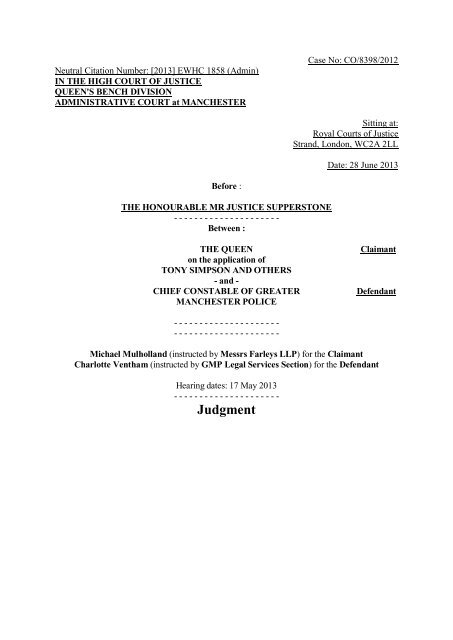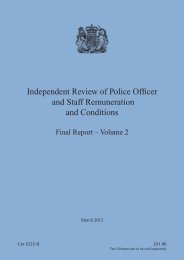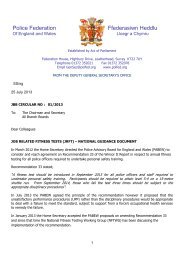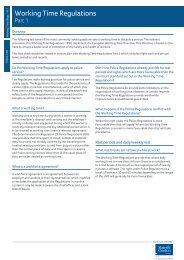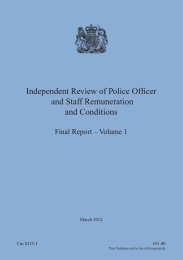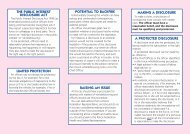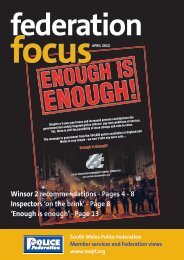High Court Judgment Template
High Court Judgment Template
High Court Judgment Template
You also want an ePaper? Increase the reach of your titles
YUMPU automatically turns print PDFs into web optimized ePapers that Google loves.
Neutral Citation Number: [2013] EWHC 1858 (Admin)IN THE HIGH COURT OF JUSTICEQUEEN'S BENCH DIVISIONADMINISTRATIVE COURT at MANCHESTERCase No: CO/8398/2012Sitting at:Royal <strong>Court</strong>s of JusticeStrand, London, WC2A 2LLDate: 28 June 2013Before :THE HONOURABLE MR JUSTICE SUPPERSTONE- - - - - - - - - - - - - - - - - - - - -Between :THE QUEENon the application ofTONY SIMPSON AND OTHERS- and -CHIEF CONSTABLE OF GREATERMANCHESTER POLICEClaimantDefendant- - - - - - - - - - - - - - - - - - - - -- - - - - - - - - - - - - - - - - - - - -Michael Mulholland (instructed by Messrs Farleys LLP) for the ClaimantCharlotte Ventham (instructed by GMP Legal Services Section) for the DefendantHearing dates: 17 May 2013- - - - - - - - - - - - - - - - - - - - -<strong>Judgment</strong>
Mr Justice Supperstone :Introduction1. The Claimants are all serving police officers within the Greater Manchester PoliceForce. They are Constables and Sergeants who have (1) passed the necessary tests forpromotion to the next rank, and (2) been told that they have passed the “liveassessment stage” and that they will be promoted subject to an appropriate vacancybeing available and a professional standards check. Notwithstanding that theClaimants were each informed between April and May 2012 that the result achievedat the Assessment Centre during 2009 would no longer stand for immediatepromotion (see para 16 below). The Claimants challenge this decision.2. It is common ground between the parties that this amounted to a change of status forthose officers in that, prior to the decision, they represented at the very least the poolfrom which officers had been chosen and that thereafter they were no longer membersof that pool; indeed the pool itself ceased to exist.3. The central issue in this application is whether the offer made to each of them onpassing the live assessment stage gave each of them a legitimate expectation theywould be promoted (subject to an appropriate vacancy being available and aprofessional standards check). The Claimants contend that this was a legitimateexpectation of a benefit which is substantive, not simply procedural; alternatively thatif there was not such a substantive expectation, there was nevertheless a promise orpractice which induces a legitimate expectation of being consulted before a particulardecision is taken.4. The Defendant’s case is that the Claimants did not have a legitimate expectation of asubstantive benefit of the kind alleged or at all; alternatively if they did have alegitimate expectation of a substantive benefit, the frustration thereof was justified byoverriding public interest considerations. Further the Defendant contends that thedecision was not unlawful by reason of procedural unfairness: any procedural benefitin the form of consultation of which the Claimants had a legitimate expectation wasamply satisfied.5. On 5 December 2012 His Honour Judge Wood QC granted permission to apply forjudicial review.Factual background6. At the time of the decision the Claimants had all undergone the promotion selectionprocess set out in the Defendant’s “Promotion Selection Policy for Police Officers”(dated 15 April 2005) (“the Policy”). They had all successfully completed the processin 2009 or 2010, having received a “pass” at the final assessment stage. In thosecircumstances, the Policy provided that each candidate“will (emphasis added) be promoted subject to an appropriatevacancy being available and a professional standards check (forexample, discipline and complaints).”7. On concluding the promotion process Sergeant Smith received a letter which stated:
“We are pleased to inform you that you have passed yourinterview for promotion to Inspector.Following your success, enquiries will now be made to confirmyour compliance with the codes of conduct, prior to any finalpromotion decision.…Following your success, you will be invited to attend apromotion parade with the Chief Constable a few days beforeyou are due to be promoted. You will be given as much noticeas possible about the date, but it will most likely be in the lastfew days of the calendar month before you are promoted. …Please note that whilst you are awaiting your promotionpost it is your responsibility to ensure that all necessarytraining, e.g. OST, First Aid, is up to date. Your promotionmay be delayed if you fail to meet the training requirementsfor a post.”8. “Candidate and Line Manager Guidance” in relation to the Greater Manchester Police(“GMP”) process for promotion from sergeant to inspector (effective from 1December 2007) includes the statement:“1. If the candidate is successful [in the interview], he/she willbe promoted……All promotions are subject to a satisfactory professionalstandards check and a suitable vacancy being available.”9. ACC Copley in her supplementary witness statement at paragraph 6 states, in relationto promotion parades that “they could take place at any time between an individualpassing the selection process for promotion and their substantive promotion”.10. The parties are in broad agreement as to how the system operated post finalassessment. Successful candidates would enter a pool of persons awaiting a suitablevacancy to arise. Ordinarily such officers would be promoted into divisional (asopposed to “branch”) vacancies. “Branch” posts usually required specialist skills andwould ordinarily be filled by an officer already substantive in the rank, although onrare occasions they too would be passed to the Assessment and Career ProgressionUnit (“the Unit”) to be filled by officers in the pool. The Unit operated a queuingsystem, substantive promotion to the next rank being achieved in accordance with theindividual’s position on the list. Constable Keenaghan in her witness statementstates:“6. As the promotions moved along I waited patiently to beinformed of my promotion. In April 2010 I contacted theHuman Resources Department to find out where I was up to on
the promotion list. A colleague was informed that he was 18 thon the ‘waiting list’ and I was informed that I was 23 rd .7. That same colleague was promoted on 1 June 2010 and so atthe beginning of June 2010 I again made contact with theHuman Resources Department thinking that I would be close tomy promotion. I was informed by the Human ResourcesDepartment that I was now 25 th on the list. When I questionedthis I was informed by another member of staff, from thatdepartment, that I was now 7 th on that list and the next in lineon my division for promotion.”The queuing system was, however, subject to various exceptions, one being that if avacancy arose that required specialist skills it would be offered to all those officerswho had such skills, regardless of their place on the list. The exceptions are notmaterial for present purposes. The Policy did not stipulate how long a candidate waslikely or able to remain in the pool before achieving substantive promotion. Part 7 ofthe Policy headed “Monitoring and Future Review” includes the following:“This policy will be reviewed every 2 years by the AssessmentCentre Manager and, in the event that significant changes areproposed, all the parties potentially affected will be consulted.”11. On 26 April 2010 a decision was made by the Defendant’s Chief Officers’ Group toplace a freeze on the promotion system. Item 2 (“Halt to promotion applications andassessment”) of the Chief Constable’s Order dated 26 April 2010 states:“Due to the current position of the Force, all promotionapplications and assessment centres for constable to sergeantand sergeant to inspector have been halted. The onlyexceptions are confirmed detective inspector assessmentcentres.Given the situation, the Force has decided it will take theopportunity to review the promotion process currently in placefor sergeants and inspectors.When the Force is ready to reinstate the promotion process forconstable to sergeant and sergeant to inspector, the process maynot continue in the same way. The changes may require resubmissionof application forms. This will be communicated indue course.Officers who have received a deferred pass at assessmentcentreIf you successfully complete your agreed action plan within theagreed timeframe then you will be placed on a promotionwaiting list.
Officers who have previously attended an assessment centreand have been unsuccessfulYou can continue with your action plan, however the processmay not continue in the same way. This may require resubmissionof an application form. Again, this will becommunicated in due course.”12. Assistant Chief Constable Copley, in her first witness statement dated 18 February2013, explains the background to the decision:“3. In 2010 the government outlined a ComprehensiveSpending Review (CSR) which led to the requirement forGreater Manchester Police to make £134million of savingsbetween 2011/12 and 2014/15. This equates to 20% of theForce’s overall budget. Within Greater Manchester Police, inthe region of 85% of the Force’s expenditure is on its staff andofficers and therefore it was evident that there needed to besignificant savings made in this area.4. Over this 4 year period the Force is expected to lose in theregion of 1573 police staff posts and 1200 police officer posts.These reductions will affect all ranks and grades. The nextCSR settlement for 2015 onwards is also expected to bechallenging due to the country’s ongoing financial difficulties.”13. The promotion freeze was extended on 9 March 2011 whereupon the samenotification was given to staff that the promotion process may not continue as before,as and when the freeze was lifted.14. In March 2012 the Chief Officers’ Group met to consider a report in respect ofsuccession planning and promotions based on predicted future vacancies. The reportincluded the following:“There are currently 44 Constables pending promotion to therank of Sergeant and 7 Sergeants pending promotion to the rankof Inspector. However, the Chief Constable has stated thatAssessment Centre passes would only be valid for a period oftwo years, which has been communicated to the PoliceAuthority and Police Federation.”The report continued:“Given the findings in this report it is recommended that theforce informs the above mentioned officers that theirqualification for promotion to the next rank will no longer bevalid, regardless of the two-year implication. When the force isin a position to reinstate any promotion processes these officerswould need to re-apply, along with any other eligible officers atthat time.”
15. ACC Copley was present at the meeting of Chief Officers’ Group in March 2012. Inher first witness statement she states:“20. Following lengthy discussions, it was agreed in principleby those Chief Officers present that the freeze on promotions tothe ranks of Sergeant and Inspector should continue. This wassubject to the agreement of the Chief Constable andconsultation with the Federation. Further discussion wasrequired with the Chief Constable in respect of the validity ofPromotion Board passes…”21. In the days after the meeting of the Chief Officers in March2012, I met with the Deputy Chief Constable and the ChiefConstable. The Chief Constable agreed on the basis of thereport … that the promotion freeze would continue. Thisdecision was communicated to all officers by e-mail from theChief Constable on 5 April 2012. … The Chief Constable alsoindicated that ‘following representations from the PoliceFederation, we will be writing separately to those officers whohave passed the previous selection process to clarify their statusin any future promotion process’.22. Later the same day, following a number of enquiries byofficers, a further e-mail was sent out from the Chairman of thePolice Federation, Ian Hanson, … confirming that theFederation had been involved in discussions with the force inrelation to promotion board passes and had maderepresentations to the Chief Constable that it would be unfairfor the officers who had achieved such passes to have to startagain from the beginning of the promotion process. Mr Hansonexplained in his e-mail that a compromise position hadtherefore been reached such that, when the promotion processstarted again, those officers who had previously passed wouldbe given a pass to the Assessment Centre without the necessityof submitting papers. He commented that although thesituation was not ideal, it was better than the position originallyenvisaged.”16. On 12 April 2012 Chief Superintendent Ball wrote to Mr Simpson and otherconstables in a similar position as follows:“It is with much regret that I have to advise you that the resultyou received at the Assessment Centre during 2009 will nolonger stand for immediate promotion to the rank of Sergeant.As you can appreciate the Force has changed considerablyduring this time, primarily as a result of the current financialclimate and subsequent budget constraints. …I understand that this announcement will be considerablydisappointing to you, having worked incredibly hard to achieve
the high standard for promotion to sergeant and for continuingto maintain that standard in your present role. It has been adifficult decision trying to balance the needs of those officerswho have already qualified; with those who had submittedpapers for a Board; and those who have not had a chance toapply for promotion over the last two years. It is felt that whathas been decided is the best compromise in the circumstances.Work looking at succession planning within Force and thenumbers of necessary supervisory ranks is currently ongoing.It is hoped that by September 2012 there will be a clearerpicture as to the way forward for the future and hopefullyidentify a timescale to commence a new process forpromotions.There are no specific plans for a new promotion process at thistime, but whatever process is introduced, you will beguaranteed a place in the very final stages of that process;subject to satisfactory performance between now and then;rather than having to start all over again from the beginning.”17. A letter in similar terms was written by Chief Superintendent Ball on 9 May 2012 tosergeants who would no longer stand for immediate promotion to the rank ofinspector.Relevant statutory framework18. Section 10(1) of the Police Act 1996 provides that the Chief Constable is responsibleto ensure the “direction and control” of his police force.19. The Police (Promotions) Regulations 1996 (“the Regulations”) contains the statutorybasis for the promotions process in which the Claimants were engaged. Regulation 3deals with qualification for promotion. Regulation 4 is headed “Selection forpromotion” and merely provides that“Subject to regulation 7 [which has no application in thepresent case] promotion from one rank to another shall be byselection.”20. Ms Charlotte Ventham, for the Defendant, submits (at paragraph 13(e) of her skeletonargument) that:“In accordance with regulation 4, the Defendant had in place atall material times a promotion selection policy which includedat Appendix 1 a description of ‘the promotion selection processfor PC-sergeant and sergeant-inspector’.”21. Paragraph 1 of the Policy headed “Introduction and aims” states:
“The Promotion Selection policy for police officers describesthe promotion selection process for police officers applying forpromotion up to the rank of chief superintendent.This policy takes effect from 1 April 2005 and puts into effectthe recommendations made in the Promotion Process Review,which were agreed by the Command Policy Group inDecember 2004.As part of the Promotion Process Review, stakeholderconsultation took place with representatives of stafforganisations, divisions and departments. In addition, focusgroups and the GMP intranet site were used to consult officersat all ranks up to and including chief superintendent.The Promotion Selection policy for police officers aims toensure that:• the promotion selection process is transparent and clear topotential candidates;• all promotion candidates are treated fairly and consistently;• all promotion selection decisions are based on ability, theexperience and skills required for the rank;• the promotion selection process complies with other GMPpolicies and the statutory framework.”Appendix 1 contains the statement set out at paragraph 6 above that if the candidate issuccessful at the live assessment stage he/she “will be promoted” subject to anappropriate vacancy being available and a professional standards check.22. Appendix 2 contains the same provision in relation to the promotion selection processfor inspector to chief inspector, chief inspector to superintendent and superintendentto chief superintendent.Preliminary Issues(1) Whether the decision is amenable to judicial review23. Ms Ventham submits that the decision was a management decision in relation toresourcing and deployment issues which resulted from budgetary cuts imposed by theGovernment Spending Review. It was necessary, she contends, to introduce a changeto the promotion process in the financial circumstances that prevailed in order tooperate an efficient and competent police force with the most able officers appointedto leadership positions.24. In support of this submission Ms Ventham relies on the observations of Scott BakerLJ in R (on the application of Tucker) v Director General of the National CrimeSquad [2003] IRLR 439 at para 22:
(2) Whether the claim is academic28. The Defendant contends that the detriment that the Claimants are alleged to havesuffered has not yet taken effect. It will only do so (and then only potentially) as andwhen the new promotion process is implemented. Accordingly Ms Ventham submitsthat the premature nature of the claim renders it academic and/or unsuitable for theexercise of the court’s discretion to grant the remedy sought.29. In my judgment the application is not premature as the Claimants have lost the statusthat they had previously at the very least to be in the pool of candidates for promotionas and when the freeze is lifted (see para 2 above). Further, during the course of MsVentham’s oral submissions it emerged that it is the Defendant’s contention that thepolicy has been revoked (see para 50 below). Such a contention makes it all the moreappropriate for the Claimants to have instituted the present challenge.The parties’ submissions30. Mr Michael Mulholland, for the Claimants, submits that the offer made to each of theClaimants on passing the live assessment stage gave each of them a legitimateexpectation that they would be promoted subject to an appropriate vacancy beingavailable and a professional standards check. The Claimants’ case is that they shouldform part of the pool of officers selected for promotion. It is no part of the Claimants’present challenge that they should be placed in a queue, whether as before or at all atthis stage. The reason for this is that there has been a freeze on promotion thatcontinues and therefore it would be premature for the Claimants to complain as towhat happens when that process recommences. The decision to impose a promotionfreeze is, it is accepted, a managerial one and it is therefore not one subject to reviewby this court. However the Claimants have been told that they have been removedfrom the pool and it is that which is the subject matter of the complaint.31. Ms Ventham submits that the policy qualifies the Claimants’ expectations in twoimportant respects: first, that promotion selection itself remains subject to “anappropriate vacancy being available”. Second, the policy provides that it aims toensure that “all promotion selection decisions are based on ability, the experience andskills required for the rank”. In those circumstances she submits it cannot legitimatelybe assumed by an officer that he/she will, forever after, sit in a pool of “promotionready” candidates if vacancies do not become available or qualifications become staledue to the passage of time. Ms Ventham submits that the second of those factors inparticular militates against the existence of a legitimate expectation of a substantivebenefit because it would impact on the quality of the policing service available to thepublic if promotions could not be made based on ability and the experience and skillsrequired for the rank.32. Alternatively Ms Ventham submits that any such legitimate expectation that theClaimants did enjoy, endured only for a limited period of time, having regard to theprinciple that promotion should be subject to ability. At the time of the decision theClaimants’ passes were already two to three years’ old and there was no likelihood ofvacancies for promotion becoming available in 2012/13. In those circumstances anylegitimate expectation the Claimants may have had that they would not lose theireligibility for immediate promotion must, she submits, reasonably have come to anend before the time the decision was made.
33. Further it is the Defendant’s case that even if the Claimants did have the legitimateexpectation for which they contend, this was overridden by the public interest insecuring an efficient and effective police force for the prevention and detection ofcrime. Ms Ventham contends that the decision about which complaint is made inthese proceedings was taken having regard to the combined effect of a number ofmatters: inevitable and substantial further budgetary cuts; ongoing uncertainty as tothe future “establishment”; the wholly realistic expectation that a reduced number ofsupervisory posts would be available on a permanent basis in years to come; the everincreasingage of the Claimants’ passes; and the closure of the promotion selectionprocess for the preceding two years. In those circumstances it is submitted that it wasproper to require the Claimants to repeat the final stages of any new process that isintroduced with a view to ensuring that the Claimants, and others in the same positionas them, continue to display the skills and qualities necessary for promotion topositions of responsibility and leadership; and also so that the competition for thoseposts available upon the lifting of the freeze is extended to officers behind theClaimants in the promotion process, not only out of fairness to those officers buthaving regard to the public interest in ensuring that the most able and suitable officersare promoted.34. Finally it is the Defendant’s case that procedural fairness was amply met by thedecision making process adopted in this case.35. Mr Mulholland submits that the fact the promotion selection itself remains subject to“an appropriate vacancy being available” does not prevent the creation of a legitimateexpectation because it is part of the Claimant’s legitimate expectation that they shouldbe promoted into a suitable vacancy if that is how the system operated. Further theClaimants accept that this substantive expectation could not last for life. This was acase where the pool itself was dissolved rather than having persons removed from itfor cause. There is nothing to prevent the Defendant re-starting the promotion processbefore lifting the freeze, and there is nothing that precludes the admission of othersuitably qualified candidates into the same pool as the Claimants.36. Mr Mulholland submits that the evidence does not support the assertion that as andwhen the freeze on promotions is lifted the skills of the Claimants will be outdated orirrelevant. Indeed the evidence filed on behalf of the Claimants is that many of themhave had substantial periods in post, during the promotion freeze, actually carryingout the roles of officers in the ranks for which they have been selected for promotion(see, for example, witness statement of Sergeant Smith at paragraphs 19 and 21-22).There was no justification, he submits, for the change in policy.37. Finally, Mr Mulholland submits that at the very least the Claimants had the right to beinformed as to what the overriding justification was for what was clearly a loss ofstatus. He submits that the Claimants had a legitimate expectation that they would beconsulted, having been selected for promotion in accordance with Regulation 4. Only47 officers had such an immediate and present interest and it would not, he submits,have placed an inordinate burden on the Defendant to consult with them. Further theDefendant he submits, acted in breach of the requirement of procedural fairness.
Discussion38. Mr Mulholland contends that the Claimants had a legitimate expectation of asubstantive benefit of the kind described as the “third category” of case in R v Northand East Devon HA, ex parte Coughlan [2001] QB 213, per Lord Woolf MR atparagraph 57. Ms Ventham contends that there was no representation or promisemade that was “clear, unambiguous and devoid of relevant qualification” to the effectthat they were guaranteed to retain their “promotion-ready” status (see R v Board ofInland Revenue, ex parte MFK Underwriting Agencies Ltd [1990] 1 All ER 91, perBingham LJ at 110).39. In R (on the application of Bhatt Murphy (a firm) and others) v Independent Assessor[2008] EWCA Civ 755 Laws LJ, in a judgment with which Sir Anthony Clarke MRand Sedley LJ (subject to a gloss) agreed, reviewed the doctrine of legitimateexpectation. The cases show that put broadly the doctrine encompasses two kinds.There is procedural legitimate expectation, and there is substantive legitimateexpectation. In the procedural case there is a promise or practice of notice orconsultation in the event of a contemplated change in policy. In a substantive casethere is a promise or practice of present and future substantive policy (para 33).40. In respect of substantive expectation, Laws LJ stated at para 43:“Authority shows that where a substantive expectation is to runthe promise or practice which is its genesis is not merely areflection of the ordinary fact… that a policy with no terminaldate or terminating event will continue in effect until rationalgrounds for its cessation arise. Rather it must constitute aspecific undertaking, directed at a particular individual orgroup, by which the relevant policy’s continuance is assured.”Laws LJ added (at para 46):“though in theory there may be no limit to the number ofbeneficiaries of a promise for the purpose of such anexpectation, in reality it is likely to be small, if the court is tomake the expectation good.”The broader the class claiming the expectation’s benefit, the more likely it is that asupervening public interest will be held to justify the change of position complainedof.41. The paradigm case of procedural legitimate expectation, Laws LJ explained (at para29)“arises where a public authority has provided an unequivocalassurance, whether by means of an express promise or anestablished practice, that it will give notice or embark uponconsultation before it changes an existing substantive policy.”42. There is a secondary case of procedural legitimate expectation where there has beenno previous promise or practice of notice or consultation. Laws LJ apprehended that
this category of legitimate expectation “would not often be established”. He stated (atpara 49):“… for this secondary case of procedural expectation to run,the impact of the authority’s past conduct on potentiallyaffected persons must, again, be pressing and focussed. Onewould expect at least to find an individual or group who inreason have substantial grounds to expect that the substance ofthe relevant policy will continue to enure for their particularbenefit: not necessarily for ever, but at least for a reasonableperiod, to provide a cushion against the change. In such a casethe change cannot lawfully be made, certainly not madeabruptly, unless the authority notify and consult.”43. Laws LJ added a “Postscript” to his judgment at paragraph 50:“A very broad summary of the place of legitimate expectationsin public law might be expressed as follows. The power ofpublic authorities to change policy is constrained by the legalduty to be fair (and other constraints which the law imposes).A change of policy which would otherwise be legallyunexceptionable may be held unfair by reason of prior action,or inaction, by the authority. If it has distinctly promised toconsult those affected or potentially affected, then ordinarily itmust consult (the paradigm case of procedural expectation). Ifit has distinctly promised to preserve existing policy for aspecific person or group who would be substantially affectedby the change, then ordinarily it must keep its promise(substantive expectation). If, without any promise, it hasestablished a policy distinctly and substantially affecting aspecific person or group who in the circumstances was inreason entitled to rely on its continuance and did so, thenordinarily it must consult before effecting any change (thesecondary case of procedural expectation). To do otherwise, inany of these instances, would be to act so unfairly as toperpetrate an abuse of power.”44. In my view the terms of the policy and past practice did amount to a promise that was“clear, unambiguous and devoid of relevant qualification”. It was a promise thathaving attained a pass in the promotion process the Claimants would be within thepool of officers selected for promotion.45. In order to achieve a “pass” the officers plainly acted to their detriment. Thecommitment required to complete the process was personal, emotional and financial(see witness statement of Sergeant Smith at paras 3 and 11, for example).46. I do not accept the Defendant’s contention that the requirement that there be anappropriate vacancy available prevents the creation of a legitimate expectation. It ispart of the Claimants’ legitimate expectation that they will be promoted into a suitablevacancy because that is how the system operated. I also do not consider that becausethe policy provides that it aims to ensure that “all promotion selection decisions are
ased on ability, the experience and skills required for the rank” that that too preventsthe creation of a legitimate expectation. The policy describes the promotion selectionprocess for police officers applying for promotion up to the rank of chiefsuperintendent. Pursuant to that policy all promotion selection decisions are based onability, and the experience and skills required for the rank. The Claimants wereselected in accordance with that policy and that policy stated that successfulcandidates “will be promoted subject to an appropriate vacancy being available and aprofessional standards check”. In my view the Claimants have a legitimateexpectation that they will be promoted on that basis.47. This specific undertaking was directed at a particular group, namely those officerswho passed the selection process (see Bhatt Murphy at para 43).48. In Ex parte Coughlan Miss Coughlan and seven comparably disabled patients hadbeen given a clear promise by the health authority that a particular facility, MardonHouse, would be their home for life. But the health authority decided to closeMardon House which had ceased to be financially viable. The Claimants accept thatthe promise in their case is not for life. Indeed the policy expressly states that it “willbe reviewed every two years by the Assessment Centre Manager”. However in myview that does not mean that they did not have a substantive legitimate expectationwhich was to continue “until rational grounds for its cessation arise” (Laws LJ inBhatt Murphy at para 43, see para 40 above).49. The first witness statement of ACC Copley had suggested that the “pass” had a twoyearlife span. However Sergeant Smith’s evidence is that this “rule” was neverdocumented and “has never been mentioned by either the assessment centre, thePolice Federation, or even the Chief Constable to me, or to the best of my knowledgeany other affected officer at any time since 2009” (see witness statement at para 17).During oral submissions it became clear that the Defendant is no longer relying uponthis suggested limitation for the lifespan of a pass.50. In my view the critical question in relation to the substantive legitimate expectation iswhether the continuing freeze on promotions in the changed financial circumstancesjustified the change of position complained of. Ms Ventham in her oral argumentsubmitted that the policy had been revoked and that there is no promotion selectionprocess in existence at the present time. I accept Mr Mulholland’s submission thatthis is not correct. The process contained in the policy may be frozen because there isa freeze on promotions. It does not follow that there has been revocation of thepolicy. The Chief Constable’s Order of 26 April 2010 (see para 11 above) refers toall promotion applications and assessment centres having been “halted” (with theexception of confirmed detective inspector assessment centres). The Order states:“When the Force is ready to reinstate the promotion process forconstable to sergeant and sergeant to inspector the process may[emphasis added] not continue in the same way.”The process has been suspended, but there is no suggestion in that 2010 Order that thepolicy has been revoked.51. The Claimants accept that the position of individual officers in the pool may besubject to review for good cause. Further Mr Mulholland accepts (whilst of course
making no concessions) that the Defendant may have justification for changing thepolicy in the future which may impact on the position of officers presently in the pool.52. In Paponette and others v Attorney General of Trinidad and Tobago [2010] UKPC 32the Privy Council held that unless a public authority provided evidence to explainwhy it had acted in breach of a representation or promise made to an applicant, it wasunlikely to be able to establish any overriding public interest which justified thefrustration of the applicant’s legitimate expectation. Lord Dyson observed atparagraph 42:“The breach of a representation or promise on which anapplicant has relied often, though not necessarily, to hisdetriment is a serious matter. Fairness, as well as the principleof good administration, demands that it needs to be justified.Often, it is only the authority that knows why it has gone on itspromise. At the very least, the authority will always be betterplaced than the applicant to give the reasons for its change ofposition. If it wishes to justify its act by reference to someoverriding public interest, it must provide the material on whichit relies.”53. The decision letters of 12 April 2012 and 9 May 2012 advising the Claimants that“the result you received at the Assessment Centre during 2009 will no longer stand forimmediate promotion to the rank of” sergeant and inspector respectively merely statedthat “the Force has changed considerably during this time, primarily as a result of thecurrent financial climate and subsequent budget constraints” which has led toreductions in the establishment for sergeants and inspectors and in expectation thatthere will be further reductions in these ranks. The letters continue:“There are no specific plans for a new promotion process at thistime, but whatever process is introduced, you will beguaranteed a place in the very final stages of that process;subject to satisfactory performance between now and then;rather than having to start all over again from the beginning.”The letters do not explain why if there were “no specific plans for a new promotionprocess” at the time and the policy had not been revoked but promotion applicationsmerely “halted” (see para 11 above) it was necessary to take the decision to empty thepool at this time.54. The Defendant does not now suggest that the qualifications of officers who were inthe pool would not be suitable for promotion. ACC Copley in her second witnessstatement at paragraph 14 states:“I understand that there was a decision to fill temporary postswith officers who had passed their Boards by the StrategicResourcing Group in 2010. I have no recollection that suchdecision was rescinded. … I can confirm that the Force doesall it can to post the most suitable staff into vacancies as theyarise and it is likely that those who have passed their Boardswill be most suitable in the majority of circumstances.”
55. I am not satisfied on the evidence that the qualifications and skills of the Claimantshad become “stale” at the time the decisions were taken (see para 36 above). Furtherin my view the appropriate time to consider whether the Claimants continued todisplay the skills and qualities necessary for promotion is when specific plans for anew promotion process are under active consideration or at a time when it isanticipated the promotion freeze will be lifted and the requirements of the Force canbe properly assessed.56. In my view no proper reasons have been given by the Defendant for its change ofposition in relation to the Claimants who were in the pool when the decision wasmade.57. Further, at the very least the Defendant should have consulted with the Claimantsbefore changing the existing substantive policy. Paragraph 7 of the policy headed“Monitoring and Future Review” states that “in the event that significant changes areproposed” to the policy “all the parties potentially affected will be consulted”. In myview this amounted to an unequivocal assurance by means of an express promise thatthe Defendant would embark upon consultation before significantly changing thepolicy. Plainly the Claimants are “parties potentially affected”, and it is not suggestedthat the changes are not “significant”.58. The Defendant accepts that there was no consultation with the Claimants individually.Further there is no evidence that any consultation that did take place with the PoliceFederation was with the Federation acting on behalf of the Claimants.59. In any event, as appears from the first witness statement of ACC Copley (paras 20-22)and the contemporaneous documentation, the discussions that took place between theForce and the Federation which led to the “compromise” only did so after the ChiefOfficers’ Group recommended on 26 March 2012 that“the force informs the above mentioned officers [who hadsuccessfully passed their assessment centre] that theirqualification for promotion to the next rank will no longer bevalid, regardless of the two-year timescale. When the force isin a position to re-instate any promotion processes the officerswould need to re-apply, along with any other eligible officers atthat time”.On 5 April 2012 Mr Hanson wrote:“We in the Federation considered that this was immenselyunfair and have been involved in discussions with the force onthis. As a result of this a compromise position has beenreached which is that when the process starts again thoseofficers who had obtained a pass will be given a pass to theAssessment Centre without the necessity of submitting papers.We realise that this is not ideal and this will come as a greatdisappointment to those who have worked so hard, but it isbetter than the position we were initially going to be in.”
60. In my view there was no proper consultation on the change of position that led to thedecision, even with the Police Federation, when the proposals were still at a formativestage (ex parte Coughlan at 108, per Lord Woolf MR).Conclusion61. In summary in my judgment, (1) the Claimants had a substantive legitimateexpectation that on passing the live assessment stage they would be promoted subjectto an appropriate vacancy being available and a professional standards check; (2) theDefendant has not justified the frustration of the Claimants’ legitimate expectation;(3) if there was not such a substantive expectation, the Claimants had a legitimateexpectation that they would be consulted before the decision; (4) there was no properconsultation with the Claimants; and the Defendant acted in breach of the requirementof procedural fairness.62. For the reasons I have given the decision of the Defendant is unlawful.63. In these circumstances, the parties are agreed that the Defendant’s decision that theresults achieved by the Claimants in the final assessment of the promotion processshould no longer stand for immediate promotion is to be quashed.


